Enlit - Mapping hydrogen, skills and energy planning for Dutch energy transition
This article was originally published by Enlit on 8 March 2024.

The energy transition is bringing new technology, planning and skills needs in the Netherlands, panellists indicated at the Road to World Energy Congress 2024 event in Rotterdam.
Opening the discussion, organised by the Future Energy Leaders of the World Energy Council (WEC) in the Netherlands, Rene Peters, Business Director Gas Technology at Dutch technology organisation TNO and Board Member of WEC Netherlands, pointed to the importance of the North Sea and the Netherlands’ role within it for the energy transition as it expects to grow its offshore wind to around 20GW in the next few years from less than 5GW currently.
“That’s the electricity part and it’s relatively simple as there is already an electricity market,” he said.
“But now hydrogen is coming and that’s different as there is no hydrogen infrastructure or market yet and we need to build a full value chain,” he continued, noting that it is also an area where the Netherlands can be a frontrunner with an existing gas infrastructure than can be retrofitted for hydrogen use – up to 85% it is believed.
“We’ve started doing that, actually taking the lead and I think we are one of the few countries in the world with a gas infrastructure becoming available for new functions like hydrogen,” he commented, saying that while that refers to the onshore infrastructure, the offshore infrastructure could similarly be available for hydrogen transport.
“It’s a huge investment we need to make and we also will need the new technology for offshore production of hydrogen.”
The Netherlands’ advantage
Maria van der Hoeven, Special advisor on energy literacy at the WEC and a former executive director of the IEA, reiterated that the Netherlands with its gas infrastructure has an advantage compared to other countries.
But three areas need to be addressed, she said – the planning around the transitioning of the existing pipelines with the need to continue to supply gas, the need to move away from the ‘colouring’ issues of hydrogen with a certification based on origin and the development of the marketplace.
“Why not see to it that there is a marketplace in the Netherlands? The demand is going to change as there are companies that want to have hydrogen to decarbonise their operations. If one is starting on the supply side one also needs to start at the same time to build enthusiasm for the demand side.”
An example cited of such an uptaker is Thyssenkrupp in Germany, which is being incentivised to ‘green’ its steel production if its stated target is met and its loss if not.
Skills and labour
Another challenge alongside the need for investment is that for skills and in particular attracting young people into the sector, with currently only about 1 in 10 of the Dutch workforce believed to be working in the ‘green sector’.

Aniek Moonen, co-chair of the Board of Trustees of the NGO ‘Women Engage for a Common Future’, said she was excited by the prospect of being able to attract more young to the sector as she had observed many examples of young people going into businesses and asking critical questions about sustainability.
“We have seen cases of young people going into businesses that have used sustainability to promote themselves but leaving shortly afterwards because they don’t actually live up to those statements. I think this is a driver for change and companies can say they are being sustainable but they need to ask if they are actually doing it.”
On the wider issue of general labour shortages, she said that while attracting talent from outside and encouraging more people to work full-time might help at best to a limited extent, more important is to consider the demand side of labour.
“It’s about what sectors we want to have in the future and then to boost jobs in those sectors. There may be certain sectors that need to be rethought that are performing inefficiently and need subsidies.”
The concept is controversial but it’s a discussion that is needed, she stressed, pointing to the “creative destruction” of industries as something of all times.
“It always happens and sometimes we just have to let that frame of destruction happen.”





